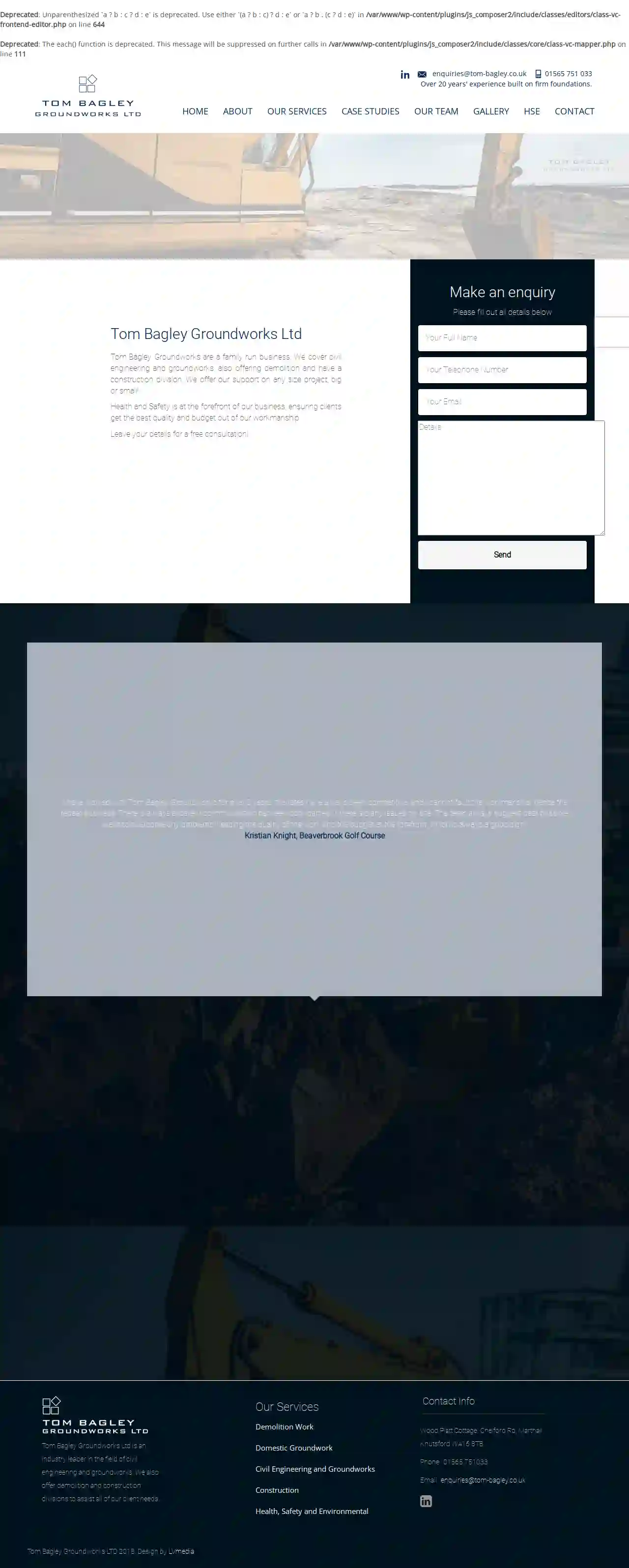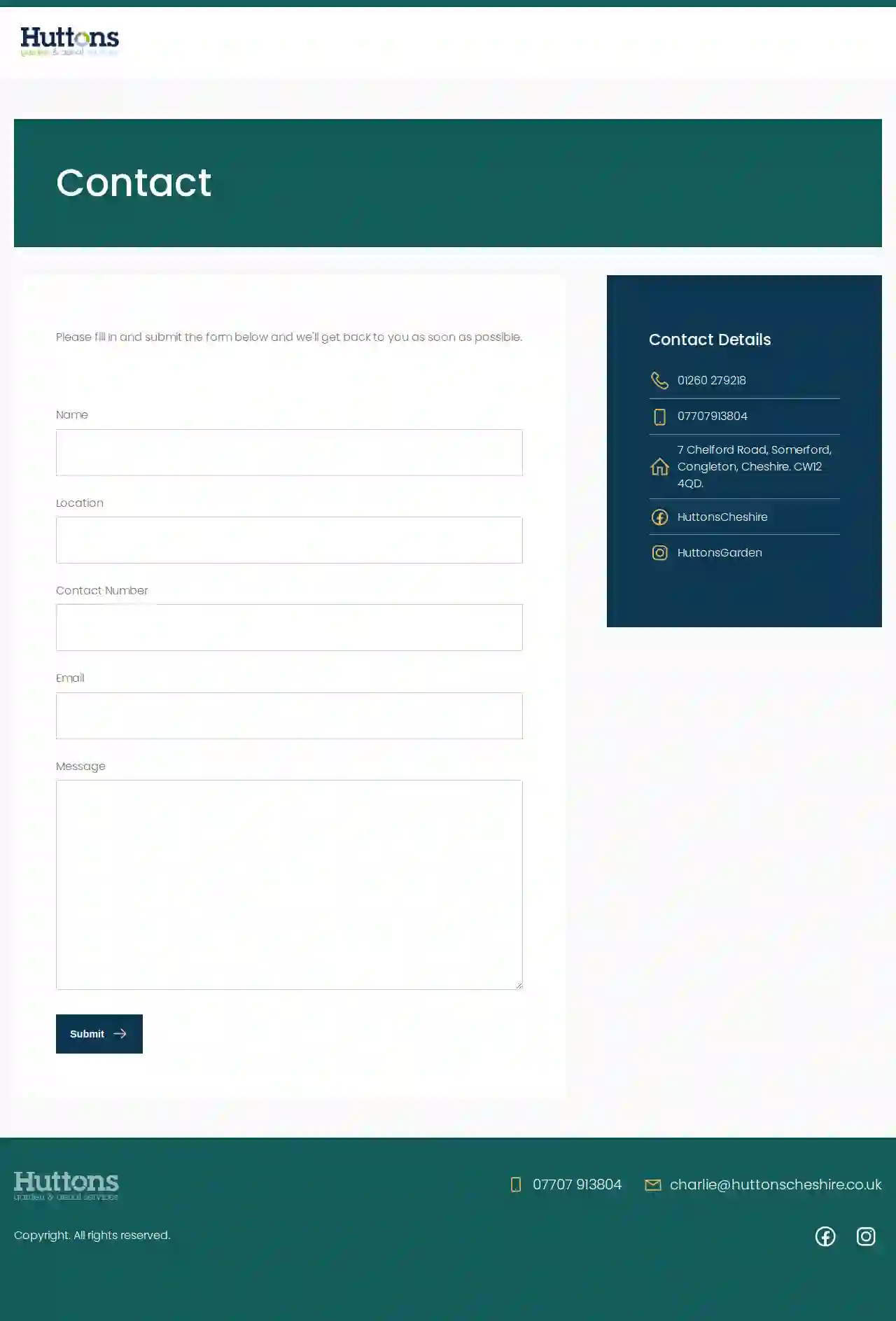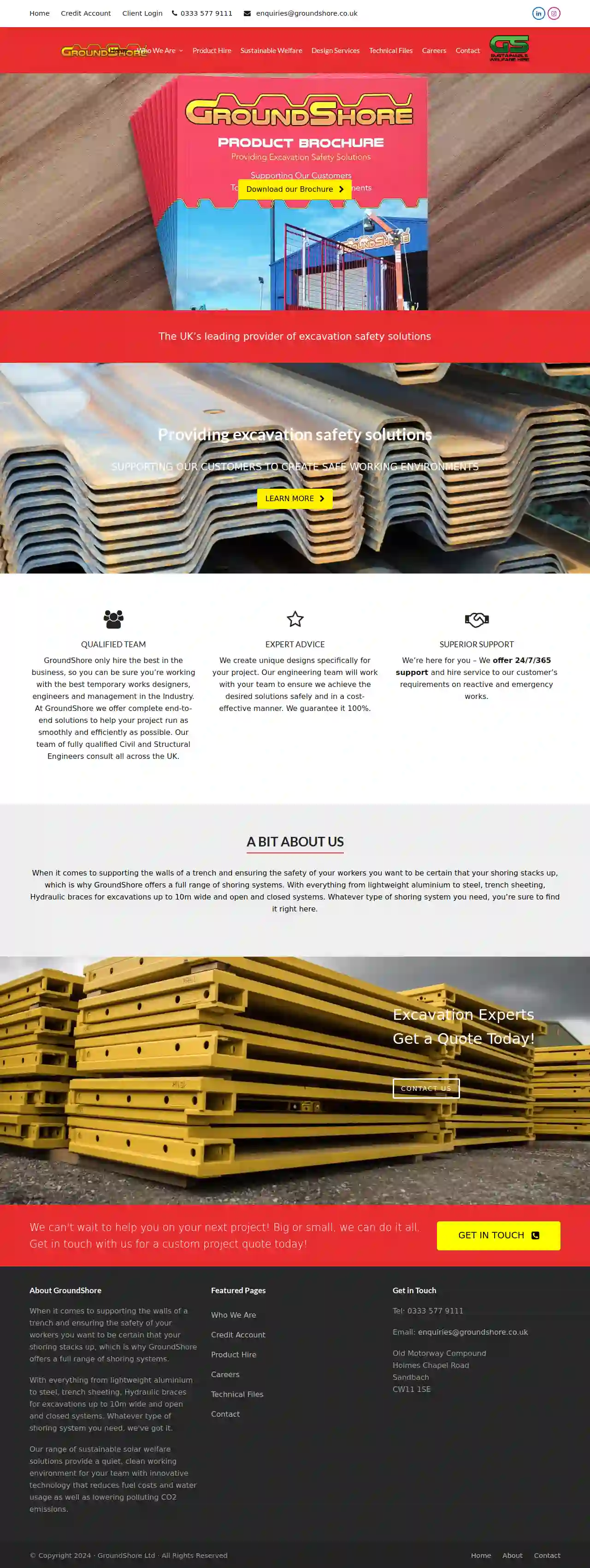Excavation Contractors Middlewich
Top 10 Excavation Companies in Middlewich
Receive up to 3 Excavation Contractors quotes for your project today! Compare profiles, reviews, accreditations, portfolio, etc... and choose the best offer.

Pulse Design & Build
Pulse Design & Build, Radnor Park, Pulse Design & BuildRadnor ParkGreenfield RoadCongletonCheshire, Congleton, CW12 4TW, GBPulse Design & Build Ltd We are a dynamic, growing, building and refurbishment contractor, operating from Congleton, Cheshire with a passion for excellence. We focus on creating genuine, positive relationships with our customers and supply chain, tailoring our services to customer requirements. Our background includes a strong track record in the leisure and gym sectors and our goal is to be the ‘Go To’ contractor of choice for discerning customers, with services delivered by highly experienced, qualified, professional staff dedicated to achieving the very highest quality of workmanship, on time, on budget, every time. Pulse Design & Build Ltd undertakes design and new build, alterations & refurbishment, extensions, repair, remodelling and refreshment contracts for public and private clients to their built environment portfolios. Whether in the leisure, industrial, commercial, housing & residential, hospitality or civic sectors, clients can be assured of a highly personal, attentive service, and a consistent professional approach to design, pre-construction, construction, and aftercare. Careful and considered planning is the foundation upon which all successful projects are built. Pulse Design & Build senior management team’s extensive experience, enables the company to work from an early project stage through to completion. We work alongside our project teams, clients, designers, engineers, subcontractors and end users to maximise innovation, design and buildability to achieve an accurate budget, delivery programme and high-quality completion.
- Services
- Why Us?
- Gallery
Get Quote
Cheshire Demolition & Excavation Contractors Ltd
4.891 reviewsUnit 1, Cheshire Business Park, Winsford, GBCheshire Demolition: The Reclamation & Recycling Experts Established in 1985, Cheshire Demolition has been a leading force in the demolition, excavation, and building industry for over four decades. We take pride in our commitment to sustainability, with over 99% of all materials we handle being recycled, reused, or repurposed. Our Mission At Cheshire Demolition, we strive to provide our clients with comprehensive and efficient demolition and excavation services while adhering to the highest environmental standards. We believe in responsible waste management and are dedicated to minimizing our impact on the environment. Our Services We offer a wide range of services to meet the diverse needs of our clients, including: Demolition & Excavation Commercial Demolition Site Clearance Soft Strip Out Emergency Demolition Residential Demolition Remediation Skip & Grab Hire Skip Hire Grab Hire Recycling & Waste Management Aggregates & Building Supplies Asbestos Removal Reclamation Yard Our Commitment to Sustainability We are committed to sustainable practices and believe in the circular economy. We strive to reduce our environmental impact by: Recycling and reusing materials whenever possible Minimizing waste generation Promoting responsible waste management Supporting local businesses and communities Our Team Our team of experienced professionals is dedicated to providing our clients with the highest quality services. We are committed to safety, efficiency, and environmental responsibility.
- Services
- Why Us?
- Gallery
Get Quote
TEM Groundworks Ltd
3.73 reviewsCongleton, GBWelcome to TEM Groundworks LTD Where we take pride in offering top-tier groundworks services for all your construction and landscaping needs. With a wealth of experience and a dedicated team of professionals, we are committed to delivering high-quality results while adhering to the highest standards of safety and efficiency. Whether you require groundwork solutions for residential, commercial, or industrial projects, we have the expertise and resources to meet and exceed your expectations. At TEM Groundworks, we strive to be your trusted partner in bringing your vision to life, one foundation at a time. Custom solutions Every project is unique. TEM Groundworks aims to tailor solutions to meet specific client needs. Whether it’s drainage, foundations, landscaping, driveways, patios or any general groundworks we are adaptable and will strive to make clients dreams become a reality. Bringing devotion and perfection to every job
- Services
- Why Us?
- Gallery
Get Quote
Brick By Brick Construction
53 reviews39 Riverside Drive, Prestbury, Macclesfield, SK10 3PD, GBAbout Us Our Macclesfield family run Construction Company offers new Extensions, repairs and restorations. Occupied properties and sites are never a problem. The Complete service and management is always offered for jobs of all sizes. Working Together We offer an end-to-end client experience that includes seamless communication, budgeting, staffing, on-site organization, and solid, quality handiwork every time. Why Choose Us? We work with architects and designers to produce beautiful, functional structures. Call us today and bring our project management skills and extensive construction experience to your next project.
- Services
- Why Us?
- Gallery
Get Quote
Tom Bagley Groundworks
Wood Platt Cottage, Chelford Rd, Marthall, Knutsford, WA16 8TB, GBTom Bagley Groundworks Ltd Tom Bagley Groundworks are a family run business. We cover civil engineering and groundworks, also offering demolition and have a construction division. We offer our support on any size project, big or small! Health and Safety is at the forefront of our business, ensuring clients get the best quality and budget out of our workmanship.
- Services
- Why Us?
- Testimonials
- Gallery
Get Quote
Coopers Construction
104 West Road, Congleton, England, CW12 4EU, GBBuilding & Construction Professional & Reliable Builders in Congleton Are you looking for trustworthy builders in Congleton? The team at Coopers Construction Ltd are here to help. We’re highly skilled and qualified builders with many years of experience in carrying out home extensions, loft conversions, renovations and damp proofing. Get in touch today for a free quote! About Us Coopers Construction Ltd are Congleton’s premier home extension and loft conversion experts. We specialise in a wide variety of bespoke home extension projects in Congleton and surrounding areas. Our solutions are designed to expand your space, and breathe new life into your home. Maybe you need more space for your growing family, or you would like to increase the value of your property, our builders are qualified, highly experienced extension specialists, here to help! Why Choose Us? Our team are highly experienced and we’ve worked on all kinds of construction projects. When working with Coopers Construction Ltd, your project will be simple and stress-free. We can help with all aspects of building work, from planning to design, to approvals. All you have to do is let us know your ideas. “These guys have got to be the best we’ve ever hired; young, hard-working and professional. Lewis Cooper has cracked it, I strongly recommend Coopers Construction Ltd, any job large or small.” Expertise What We Do Extensions Renovations Loft Conversions Damp Proofing Trusted & Highly Recommended Professional Highly Qualified Correctly Insured Reliable Highly Recommended Affordable
- Services
- Why Us?
- Testimonials
- Gallery
Get Quote
Super Drainage Solutions
516 reviewsBeechfield House, Winterton Way, Beechfield House Winterton Way Lyme Green Business Park Macclesfield, Macclesfield, SK11 0LP, GBWelcome to Super Drainage Solutions Our company specializes in providing high-quality drainage services for customers in North West, England and North Wales. We take pride in our ability to resolve all drainage issues promptly, professionally, and to the highest standards. Super Drainage Solutions is committed to providing exceptional drainage services to our valued customers. We are highly reliable, professional, and dedicated to ensuring customer satisfaction. We firmly believe that our customers' experience with us is unparalleled, as we continuously strive to improve our company and services. Please do not hesitate to contact us for any of drainage needs.
- Services
- Why Us?
- Gallery
Get Quote
Huttons Fencing & Landscaping
527 reviews47 Chelford Road, Somerford, Congleton, Cheshire., CW12 4QD, GBHuttons Cheshire Huttons Cheshire is a family-run business with over 20 years of experience in the landscaping industry. We are passionate about creating beautiful and functional outdoor spaces that our clients can enjoy for years to come. Our Services We offer a wide range of landscaping services to meet the needs of our clients, including: Garden design Patios and driveways Decking and fencing Turfing and planting Artificial grass Water features Maintenance Our Team Our team of experienced and qualified landscapers are dedicated to providing our clients with the highest quality workmanship and customer service. We are committed to using the best materials and techniques to ensure that your project is completed to the highest standard. Get in Touch If you are looking for a reliable and experienced landscaping company in Cheshire, please get in touch. We would be happy to discuss your project and provide you with a free, no-obligation quote.
- Services
- Why Us?
- Gallery
Get Quote
Cheshire Ground Control ltd
57 reviewsGawsworth Road, Macclesfield, Cheshire, GBCheshire Ground Control Based in Cheshire, we offer a comprehensive range of groundwork and landscape design services. Our team of experienced professionals is dedicated to delivering high-quality results that meet your specific needs and exceed your expectations.
- Services
- Why Us?
- Gallery
Get Quote
GroundShore Ltd
52 reviewsOld Motorway Compound, Holmes Chapel Road, Old Motorway Compound Holmes Chapel Road Sandbach, Sandbach, CW11 1SE, GBQualified Team GroundShore only hires the best in the business, so you can be sure you’re working with the best temporary works designers, engineers and management in the Industry. At GroundShore we offer complete end-to-end solutions to help your project run as smoothly and efficiently as possible. Our team of fully qualified Civil and Structural Engineers consult all across the UK. Expert Advice We create unique designs specifically for your project. Our engineering team will work with your team to ensure we achieve the desired solutions safely and in a cost-effective manner. We guarantee it 100%. Superior Support We’re here for you – We offer 24/7/365 support and hire service to our customer’s requirements on reactive and emergency works.
- Services
- Why Us?
- Gallery
Get Quote
Over 13,059+ Excavation Companies in our network
Our excavation experts operate in Middlewich & surrounding areas!
ExcavationHQ has curated and vetted Top Excavation Contractors in Middlewich. Find the most trustworthy pro today.
Frequently Asked Questions About Excavation Contractors
- Project Size and Scope: Larger, more complex excavations naturally take longer.
- Soil Conditions: Rocky or challenging soil types can slow down progress.
- Site Accessibility: Limited access might require more time for maneuvering equipment and hauling materials.
- Weather: Inclement weather can cause delays.
- Permitting and Inspections: Waiting for permits or inspections can extend the timeline.
- Determining Soil Suitability: Assessing whether the soil can support the intended structure or load.
- Recommending Foundation Types: Advising on the appropriate foundation design based on soil characteristics.
- Addressing Drainage and Erosion Issues: Providing solutions to manage water runoff and prevent erosion.
- Evaluating Slope Stability: Assessing the risk of landslides or soil movement on slopes.
- Building on challenging soil types (expansive clay, loose sand, etc.)
- Constructing large or complex structures
- Excavating near slopes or retaining walls
- Addressing drainage or erosion concerns
- Basement Size: The larger the basement, the more excavation is required, increasing the cost.
- Soil Type: Excavating rocky or dense clay soil is generally more expensive than loose soil.
- Accessibility: Difficult-to-access sites might require specialized equipment or more labor, driving up costs.
- Foundation Type: The chosen foundation type (full basement, crawl space, slab) affects excavation needs.
- Underpinning: If underpinning (strengthening existing foundations) is necessary, it significantly increases costs.
- Disposal Fees: Hauling excavated soil to disposal sites adds to the overall expense.
- Hauling to Designated Disposal Sites: Transporting excavated material to approved landfills or recycling centers.
- Recycling or Reuse: If suitable, some excavated soil might be recycled for other projects or reused on-site for landscaping or backfilling.
- Complying with Regulations: Adhering to local and environmental regulations for soil disposal to prevent contamination or illegal dumping.
How long does an excavation project take?
What is a soil engineer, and do I need one?
How much does it cost to excavate a basement?
How do you handle soil disposal after excavation?
How long does an excavation project take?
- Project Size and Scope: Larger, more complex excavations naturally take longer.
- Soil Conditions: Rocky or challenging soil types can slow down progress.
- Site Accessibility: Limited access might require more time for maneuvering equipment and hauling materials.
- Weather: Inclement weather can cause delays.
- Permitting and Inspections: Waiting for permits or inspections can extend the timeline.
What is a soil engineer, and do I need one?
- Determining Soil Suitability: Assessing whether the soil can support the intended structure or load.
- Recommending Foundation Types: Advising on the appropriate foundation design based on soil characteristics.
- Addressing Drainage and Erosion Issues: Providing solutions to manage water runoff and prevent erosion.
- Evaluating Slope Stability: Assessing the risk of landslides or soil movement on slopes.
- Building on challenging soil types (expansive clay, loose sand, etc.)
- Constructing large or complex structures
- Excavating near slopes or retaining walls
- Addressing drainage or erosion concerns
How much does it cost to excavate a basement?
- Basement Size: The larger the basement, the more excavation is required, increasing the cost.
- Soil Type: Excavating rocky or dense clay soil is generally more expensive than loose soil.
- Accessibility: Difficult-to-access sites might require specialized equipment or more labor, driving up costs.
- Foundation Type: The chosen foundation type (full basement, crawl space, slab) affects excavation needs.
- Underpinning: If underpinning (strengthening existing foundations) is necessary, it significantly increases costs.
- Disposal Fees: Hauling excavated soil to disposal sites adds to the overall expense.
How do you handle soil disposal after excavation?
- Hauling to Designated Disposal Sites: Transporting excavated material to approved landfills or recycling centers.
- Recycling or Reuse: If suitable, some excavated soil might be recycled for other projects or reused on-site for landscaping or backfilling.
- Complying with Regulations: Adhering to local and environmental regulations for soil disposal to prevent contamination or illegal dumping.